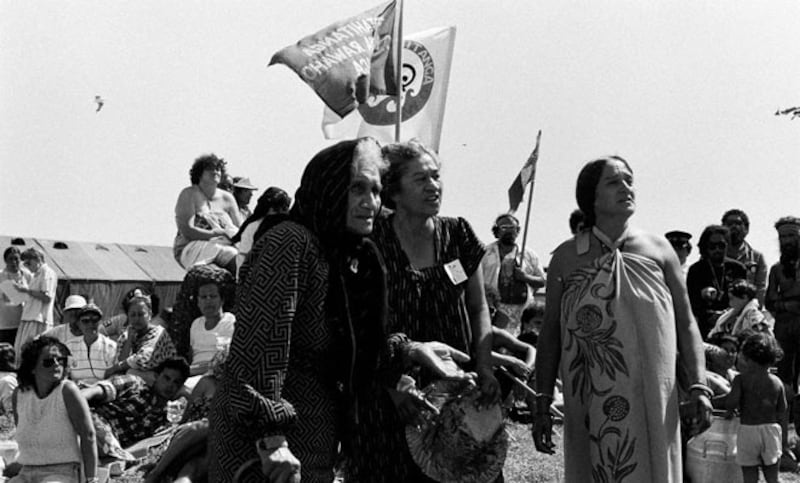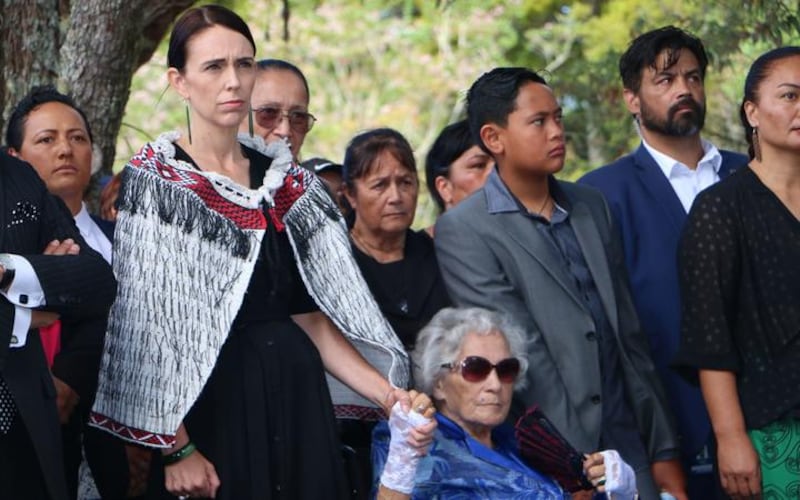Titewhai Harawira, mother of eight children, 70 mokopuna and about 25 mokopuna tuarua (great grandchildren), is of Ngāti Hau, Ngāti Wai and Ngāti Hine descent.
Formidable is the word frequently used to describe Titewhai Harawira, a matriarch who has spent a lifetime fighting for Māori rights and social justice. To her mokopuna (grandchildren), she’s the embodiment of love.
Grandson Tumamao Harawira, a reporter for Māori Television, says the legacy she has built is a source of pride but what they cherish most is the strong connection she has with each of mokopuna.
“All 70 of us!”
“Love is the biggest gift she’s given us. There’s a character she plays in public – sharp mind and sharp tongue – but on a very personal level she’s the most loving grandmother. Each individual grandchild has a special relationship with her.”
“Whatever she is to everyone else, she is the embodiment of love to us”, he says. “To us, she’s just our lovely Māmā.”
Titewhai Harawira was interviewed by Tumamao as part of a Waitangi Day tribute to women, an experience he describes as surreal.
“There’s always been a reverence for her as my grandmother so taking off my grandson hat and dealing with her on a professional and equal footing made for an interesting dynamic.”
Titewhai Harawira attributes her fighting spirit to her grandfather, Hone Pani Tamati Waaka Nene Nehua. She and her mother and aunties lived with him on the family farm at Whakapara, north of Whangarei.
She was sent to Queen Victoria Māori School in Parnell, in the footsteps of her mother’s and aunties’, while the males stayed at home and helped on the farm.
It was at Queen Vic that she staged her first protest, against a male teaching the class te reo Māori.
“I thought, hmmm, I did not come to this school to be taught by a man. The only man in my life with any influence was my grandfather.”
“So I just refused and I got sent out to stand in a corridor. That went on to polishing the corridor, and then I got sent to polish the chapel in the school.”

Titewhai Harawira, Whina Cooper and Eva Rickard stand together at Waitangi in 1985. The previous year a hīkoi (march) to Waitangi had been led by Rickard and Harawira, but had been prevented from crossing the Waitangi bridge. /
Expecting to be expelled after the principal wrote home, she was surprised but delighted when her grandfather turned up at the school.
“He said, ‘You’ve got a problem? Well, it’s your problem. She has a right to decide who teaches her here. We are paying for this.’”
She continued her fight against injustice and eventually became a key member of Ngā Tamatoa. The organisation was set up in the early 1970s and comprised young Māori who campaigned on issues such as the loss of the land and language and breaches of the Treaty.
Ngā Tamatoa was a powerful influence on her.
“Those of us in Auckland became the engine drivers for a lot of protests, beginning with the language. And when we started out the people against us – openly – were our own people,” she says.
She attributes that collective stance to the influence of Christianity – “do things nicely, talk nicely, get nothing and have to keep smiling.”
Frustrated, the members took to the streets and generated a petition with 30,000 signatures to support teaching the Māori language in schools.
“I’m so glad that everything Ngā Tamatoa fought for what we have got today: radio, TV, language, fishing, whenua rights … All of those things have come out of struggle.
“The young people need to understand that. You get nothing today by being so polite. You can be polite but you must always be honest.”

Titewhai Harawira appears alongside Prime Minister Jacinda Ardern at Waitangi / RNZ
Tumamao Harawira reflects on activism becoming a whānau occupation and on the Harawira name becoming synonymous with Waitangi Day protests.
“There have been costs to the family but we’ve learned to be resilient. The struggle, generations of it, involves the wider iwi as well. Ngāpuhi consider themselves the guardians of the Declaration of Independence 1835 and The Treaty.”
He says his grandmother’s drive and determination, and that of her famous cohorts, Hana Jackson, Eva Rickard and Whina Cooper, should inspire us all.
“And Māmā says we need to understand that the true leaders of Māori are women.”
Titewhai Harawira, who is pushing 90, hopes her legacy will continue through the generations.
“We have to make sure that what our tīpuna left for us is passed on and we have to learn to appreciate our whakapapa.”
“We own this whenua. It belongs to us and it’s time for us to wake up and take a hold of the things our tīpuna left for us, no matter what it takes.”

